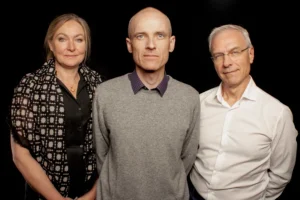
More than 340,000 Norwegians have or have had cancer, and the number is expected to rise in the coming years. The goal of the initiative – which is a collaboration between the foundation and Haukeland – is to develop more targeted cancer treatments and offer new hope to patients with serious cancer.
“Research is crucial to give patients with severe cancer new hope. Through these projects, we strengthen our ability to offer more precise and personalized treatment, and we take important steps toward improving quality of life and survival for patients who currently have few treatment options,” says Eivind Hansen, CEO of Haukeland University Hospital.
These three projects are receiving funding:
STARS – New combination treatment for aggressive brain tumors
This project, led by Bente Skeie, investigates a new treatment strategy for glioblastoma (GBM). Even after surgery, radiation, and chemotherapy, most patients experience rapid relapse, and no effective treatment currently exists.
The tumor protects itself from radiation by producing antioxidants that reduce the treatment’s effectiveness. Researchers believe that sulfasalazine (SAS), a well-known drug, may inhibit this protection and make radiation more effective. A larger international study with 108 patients is now being planned, where the effect of this drug will be tested over three months.
HUVAMER – Home-based treatment for blood cancer
This project aims to develop a new and more accessible treatment for acute myeloid leukemia (AML). AML occurs most frequently in older individuals, and survival rates are low – only one in four patients survives after three years.
Although treatments exist, they often lose effectiveness over time. The HUVAMER project, led by Bjørn Tore Gjertsen, explores a new combination of medications with the goal of achieving safe, cost-effective, and home-based treatment.
Researchers will identify biological markers that indicate who benefits from the treatment, enabling more precise and effective therapy.
NorCUP – The search for cancer’s origin
This project addresses cancer of unknown primary origin, also known as CUP. In CUP, the cancer has already spread, but it is not possible to identify where it first arose, making targeted treatment challenging. The condition is rare but serious – only one in five patients survives one year after diagnosis.
In the NorCUP project, led by Stian Knappskog, researchers use advanced analyses to determine where the cancer originated. The goal is more precise and personalized treatment that can offer better prospects for patients.
